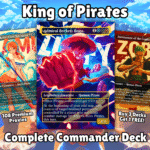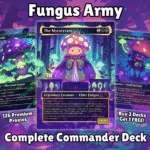You know what’s funny? A few years ago, if someone mentioned playing with unofficial MTG cards at a game store, people might’ve been a bit triggered, or at the very least raised an eyebrow. But fast forward to 2025, and the entire notion of using proxy cards in Commander decks has shed most of its old baggage. These days, more players are warming to the idea that a piece of printed cardstock can reflect creativity, freedom, and a bit of well-deserved budget relief.
Let me explain; Magic: The Gathering as a brand has grown exponentially over the past few years – new expansions, supplemental sets, and the introduction of Universes Beyond have arrived at a brisk pace. Don’t get me wrong, the growth of the game we all love is exciting, but also overwhelming. The constant reprinting of cards and the need to purchase more products to keep up with the ever growing power curve can be exhausting.
See, that’s where proxies come in – custom substitutes for official cards that help you play the decks you love without sweating over your wallet. No one likes feeling priced out of their favourite game, right?
Proxies aren’t shady knock-offs meant to trick anyone. They’re simply a way for everyday players to access the mechanics of specific cards they couldn’t otherwise afford. Think about that mystical land from Legends or that souped-up artifact that’s hovered above your spending limit for years. With a proxy, you can slip a stand-in right into your deck. In some cases, the proxy cards are even more beautiful than the originals, and in most cases, feel more personal. Lavish artworks curated by talented designers, with the help of powerful AI tools, can help create something meaningful and bespoke. In some circles, these custom pieces have even become a staple of a casual EDH player’s collection, often with personalised sleeves and boxes to match.
Now, let’s address the old taboo – A few voices out there still argue that proxies spoil the purity of Magic. They might say that if you don’t own the real card, you shouldn’t be playing it. But consider this; Magic is about gathering (lol) with friends, sharing laughter, telling stories through gameplay, and making memories. When a table agrees that using proxies is fine, what’s the harm? If everyone’s comfortable, you cut through layers of exclusion and invite players of all backgrounds to join the party. That’s a net positive – especially for newcomers who want to experiment and learn without rushing to trade their car for a rare land.
Proxies also cultivate a strong creative spirit. Imagine a Commander deck built around a certain theme – let’s say you adore dogs for example or have a fond love for anime, maybe you’d love to include that pricey creature card, but the original card art just doesn’t match your deck’s vibe. With a custom proxy, you can feature unique art that resonates with your theme. The whole deck, from lands to tokens, becomes a tapestry of self-expression. It’s not just about cost-cutting; it’s about making the deck truly yours.
Another thing that’s changed lately is the conversation itself. Communities online, whether on forums or social media, often encourage open-minded discussion about proxies. Sure, official Magic policy doesn’t allow them in sanctioned tournaments, and no one’s disputing that, but EDH Commander is usually a casual format. It’s a place where house rules and playgroup preferences matter more than corporate guidelines. If your playgroup decides to welcome proxies, you can breathe easy knowing everyone at the table can share in the fun without feeling judged.
It’s also worth noting that the custom card market has experienced a boom of late. Skilled designers and small businesses produce high-quality proxies that stand up to repeated shuffling. Many of the aforementioned have years of experience in the magic scene and have first hand experience in the game with a deeper understanding of what players crave. These people want to support the game’s spirit, not undercut it. By purchasing or commissioning these works, you’re not only saving a bit of cash but also backing independent creators who pour their hearts into their craft.
Another thing to note is that when players adopt proxies, they often experiment more. Maybe you weren’t sure about that expensive combo piece – would it feel too oppressive, or would it be just the spicy twist your deck needs? By testing with a proxy, you get to figure that out without going broke. Then, if you truly love the card’s effect and can afford it someday, nothing stops you from grabbing an official copy.
Honestly, it’s tough to see a downside when it comes to custom cards and proxies – everyone wins. The game stays dynamic when more people play it. The social bonds grow tighter when everyone can join in, no matter their budget. The art and customisation scene flourishes. New players discover the joy of a hobby that might’ve seemed out of reach before. Isn’t that what a community-driven game should be about?
So, yes, using proxies may have once been a no-go topic. But as the complexity of collecting official cards grows, and as Magic’s player base becomes more diverse, it’s natural to embrace something that broadens the game’s reach. We’re not talking about cheating. We’re talking about adapting. We’re talking about making sure the love of Magic continues to spread far and wide, carried by players who want that special combination of camaraderie, creativity, and good old-fashioned fun. And if that means slipping a custom-printed proxy into a deck now and then, why not? Go ahead. Shuffle up. Show your friends that rare card you always wanted to play. Chances are they’ll appreciate your deck’s character and heart far more than the authenticity seal on a tiny piece of cardboard. Well, hopefully anyway.
Ellis Hill





